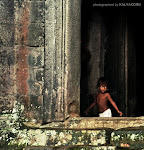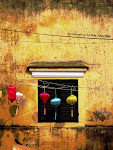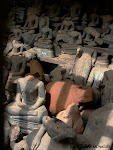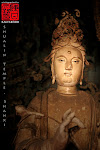By Kalyakorn Naksompop
Regarding the speech given to students from British Columbia International School
at Stamford International University, Thailand
November 7, 2010
I was asked to give an "inspiring" speech to a group of high school students from British Columbia International School, who visited our campus last week. I was very nervous because there are plenty of things I can say but I don't know if it's going to be any inspiring at all. I tried to think back about my years in high school. What was it like? How did I feel? What were other problems in life besides the stories of puppy love and stupid break ups? Then, I remember...
I remember how a lot of my friends and I struggled. We did not struggle in high school, but we struggled during the time we were in high school thinking about our future: what we wanted to be and what we wanted to do. I thought I had the passion for one thing then found out it was not real. Then, I tried so many other things until I found my love for art. I fought with my dad since he wanted me to be an economist or a lawyer. I remember when my dad asked if I wanted to be an artist and I told him "I don't know" simply because I honestly still did not know what to do with art. All I knew was I love art and that it was the only thing I wanted to do.
After high school, I took a year off just to study for the Thai entrance exam although I was already accepted by a very famous art college in Pasadena. I wanted to get into Thai government university because I wanted to learn more about Thai society since I never had that chance growing up in an international school. I finally got accepted into the university I wanted.
4 years passed by, I graduated with an art degree.. still not knowing what I wanted to do. I tried hosting TV and radio shows. I tried producing TV shows. It was fun and all, but I knew something was missing. I became a journalist because my dad wanted me to. I hated the job. It dragged me to the dark sides of the world that I don't want to see ..at least, not all the time. Then, I opened a company with my sister selling sculptures of our original designs. It was very fun. But still, something was missing.
One day, one of my best friends asked me, "Earn, why don't you be a teacher? You'll be a great one." That's when it just CLICKED! That's how I decided to start my master in education and became an educator. And I love my job! I love teaching and I love being a teacher. I've found my passion.
So, that's what I told them because I know some of these high school students are struggling to find what they want to be or what they want to study. I told them that it's okay if they're lost because it's normal. It's just a phase in life. I mean for those already have set a goal, awesome. Go for it. For the rest who are still confused, they can just stop thinking about the future and focus on what they like or what they want now.
The funny thing is that most high school students are only about 15-18 years old. They are very young, yet they are pressured by their parents and the society to have to think about "what career they want to have" when they've been introduced to only a few profession, such as doctor, journalist, businessman, teacher, scientist, artist, lawyer, or something along those lines. How can they make any decisions when some of them don't even know there are jobs like commercial diver, logistic planner, fixer, etc. Most of all, some of them may still be confused about what they want to be because the job they will end up doing in the next ten years probably does not even exist today.
Fifteen years ago, who would imagine that creating social network websites like Facebook or Twitter can be a career. Ten years ago, no one ever heard of iPhone. Today, a friend of mine is opening a company to create applications just for iPhone and iPad.
So, I said, "Try different things. Ask yourself if you like math, science, art, or any other stuff outside school. Once you find what you like, just focus on that because most of the times things that you do better are things that you love to do."
I told them they still have plenty of time. The future is yet come and they still have such a long way to go. I want them to take their time to dream and to explore.
In the end, I said, "People define happiness differently. What's your definition? You have to find what makes YOU happy. That's how you can find your passion."
การใช้ข้อมูลวิจัยจัดตารางออกอากาศ
16 years ago


.jpg)

.jpg)
.jpg)


